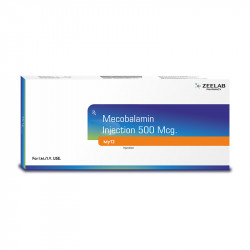Methylcobalamin
Methylcobalamin is a form of vitamin B12 that is crucial for nerve health and the production of red blood cells. It plays a key role in the metabolism of cells, including nerve function and the production of DNA. Methylcobalamin is often used to treat vitamin B12 deficiency, which can lead to conditions like anemia, neuropathy, and other nerve-related disorders. It is available in various forms, including tablets, injections, and supplements, making it accessible for patients needing vitamin B12 replacement.
Uses of Methylcobalamin
- Treats vitamin B12 deficiency, which can lead to fatigue, weakness, and anemia.
- Helps in the treatment of nerve damage, including peripheral neuropathy and diabetic neuropathy.
- Supports healthy red blood cell production and proper nerve function.
- Used to improve symptoms of conditions such as Alzheimer's disease and memory issues.
- Promotes overall neurological health and aids in the proper functioning of the brain and nerves.
How Methylcobalamin Works
Methylcobalamin works by providing the body with an active form of vitamin B12, which is essential for nerve regeneration and the production of red blood cells. It helps in the synthesis of myelin, a protective sheath around nerves, and supports healthy nervous system functions. By improving nerve health and increasing the production of healthy red blood cells, it treats deficiency-related symptoms and supports overall health.
Benefits of Methylcobalamin
- Helps correct vitamin B12 deficiency and prevents related conditions like anemia and neuropathy.
- Improves nerve health, making it useful in treating nerve damage and neuropathy.
- Boosts energy levels by improving red blood cell production and oxygen transport.
- Supports cognitive functions, including memory and mental clarity.
- Available in different forms, including injections and oral supplements, for easy administration.
How to Take Methylcobalamin
Methylcobalamin is available in tablet, sublingual, and injectable forms. The typical oral dosage for adults is 500-1000 mcg per day, depending on the severity of the deficiency. For injectable forms, your doctor will guide the frequency and dosage. It is essential to follow the prescribed dosage to avoid any side effects or overdose. Always take Methylcobalamin with water, and if using sublingual tablets, allow them to dissolve under the tongue.
Side Effects of Methylcobalamin
- Common side effects include mild diarrhea, nausea, or mild skin rashes.
- Some people may experience headaches or dizziness.
- Rarely, allergic reactions like swelling or difficulty breathing may occur.
- High doses may cause a feeling of restlessness or anxiety in some individuals.
- Overuse can lead to side effects like itching or sensitivity to light.
Safety Advice
- Consult your doctor before taking Methylcobalamin if you have any existing medical conditions, especially kidney or liver issues.
- Do not take Methylcobalamin if you are allergic to vitamin B12 or cobalt.
- Ensure that the dosage prescribed is followed to prevent overdose or side effects.
- Pregnant or breastfeeding women should seek medical advice before using this supplement.
- Keep Methylcobalamin away from children, and only use it as directed by a healthcare professional.
Frequently Asked Questions (FAQs)
Q: Can Methylcobalamin be used to treat anemia?
A: Yes, Methylcobalamin can be used to treat anemia caused by vitamin B12 deficiency.
Q: Is Methylcobalamin safe for people with diabetes?
A: Yes, Methylcobalamin is generally safe for people with diabetes and may help improve diabetic neuropathy symptoms. However, consult your doctor before use.
Q: How long should I take Methylcobalamin?
A: The duration of treatment depends on the severity of the deficiency. It is best to follow the doctor's guidance on how long to take Methylcobalamin.
Q: Can Methylcobalamin help with memory loss?
A: Methylcobalamin may improve cognitive function and memory issues caused by vitamin B12 deficiency, but its effectiveness varies from person to person.
Q: Can I take Methylcobalamin with other medications?
A: Always consult with your doctor before taking Methylcobalamin alongside other medications to avoid potential interactions.
Download India's most affordable pharmacy app
- Compare with medicine prices
- Save upto 90% on your medicine bills

Temperature Controlled storage and delivery

Regular Sanitization

Disinfected Packaging















 Added!
Added!